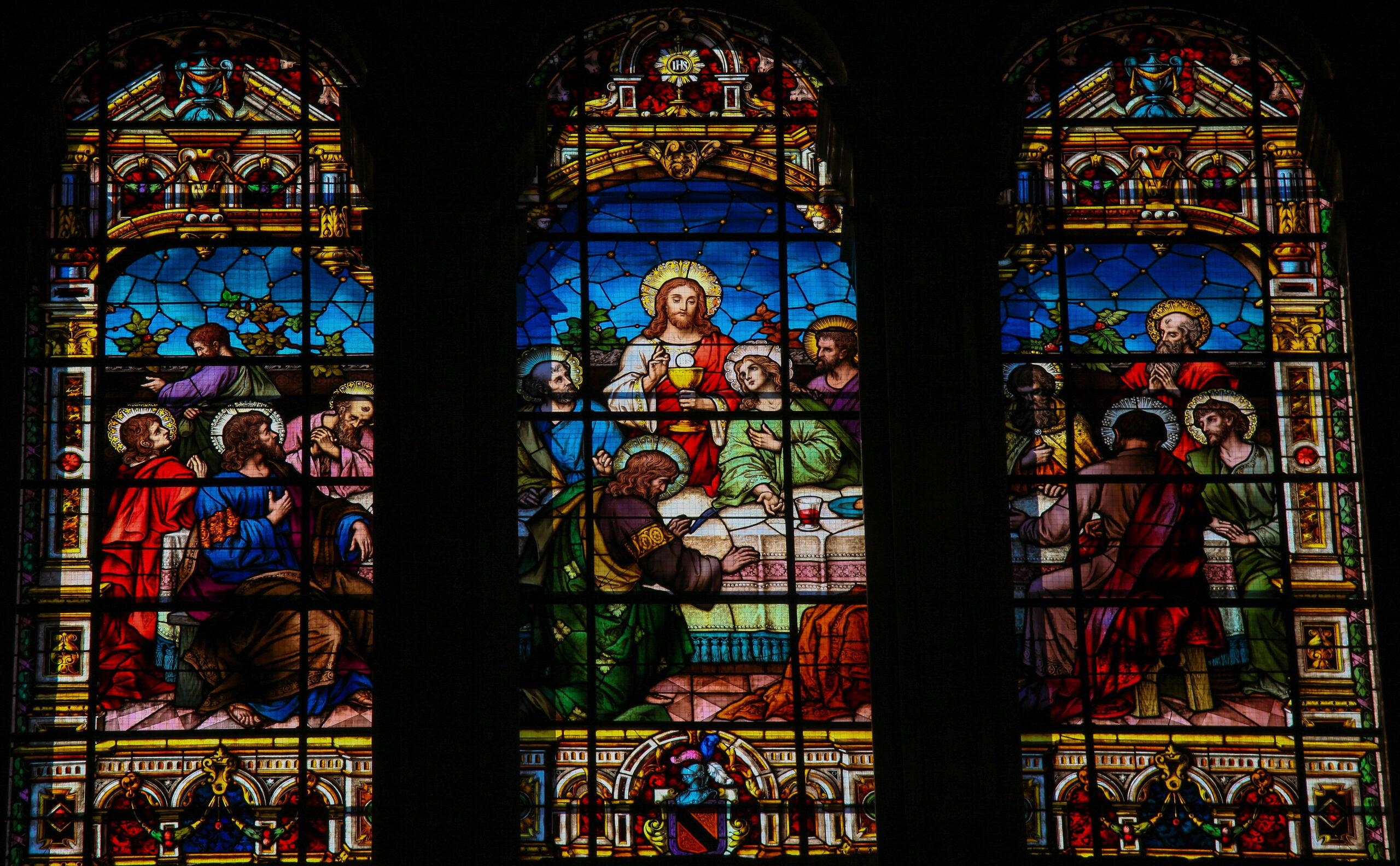When the American expatriate poet T. S. Eliot was received into the Church of England in 1927 (he would become a British subject later that year), he felt forced to start over as a writer. Nearly all his work to that point had been an exploration of despair and the faint, desperate possibility of spiritual rebirth. Having now become an Anglo-Catholic convert, he found himself without resources. As his best-known poem, The Waste Land, demonstrates, Eliot had always been a poet of quotation and collage; he cobbled together his work out of the language of the tradition and set the singularities of the squalid present within the tragic, recurrent patterns of myth.
How could he “construct” a poem that did not merely look upon tragedy and despair but which provided “something / Upon which to rejoice”? The answer came in the form of the poem from which these words are quoted: Ash-Wednesday. The choice was inevitable. The season of Lent, which begins on Ash Wednesday, marks a liturgical pilgrimage toward Christ’s resurrection and the joy of eternal life, but it begins in sober penitence, suffering, and self-denial. Along the way, it must pass through the tragedy of the cross and the tomb before emerging into the light.
By marking his conversion with a day that holds both tragedy and comedy, death and resurrection, still in prospect, Eliot found at least a partial solution to his quandary. He found a further resource in Dante, whose Divine Comedy begins on Maundy Thursday and concludes the week after Easter—even though Eliot’s conscious inspiration was not that great poem of conversion but the earlier prosimetrum the Vita Nuova. Because Eliot had already established the practice of building his poetry out of quotations, it is unsurprising that Ash-Wednesday emerges from a careful patterning of scripture and, above all, the language of the Anglo-Catholic liturgy. Dante and liturgy are the chief formal sources of the poem, but still one more source becomes visible in these late lines:
The Word without a word, the Word within
The world and for the world;
And the light shone in darkness and
Against the Word the unstilled world still whirled
About the centre of the silent Word.
This passage gives us a subtle reminder that the English poetic tradition contains not just a few resources to aid the Christian poet in writing a poem of Lenten penitence and Easter joy—it has a superabundance of them. Eliot’s “world still whirled” is an allusion to the English writer with whom he most conspicuously associated himself, the metaphysical poet and Anglican divine John Donne. Donne’s single-greatest poem is set not at the beginning of Lent but at the very end and so is called “Good Friday, 1613. Riding Westward.”
In “Good Friday,” Donne describes a planet circling in its orbit, one which, subject to the “foreign motions” of the other spheres, loses its own proper path. Just so the human soul, Donne writes, loses its own natural motion, which “devotion is,” as the busy cares of the body lead it in the opposite direction:
Pleasure or business, so, our souls admit
For their first mover, and are whirled by it.
Hence is’t, that I am carried toward the west
This day, when my soul’s form bends toward the east.
For Eliot and Donne alike, we are “whirled” by the cares of the world. We are whirled into worldliness, even as the soul knows that its one necessary task is devotion, that is, to listen to “the Word within / The world.”
Donne’s “Good Friday” is not a minor masterpiece. It is in some ways the epitome of the English lyric tradition, which had—among many—two particularly decisive early influences. First, Sir Philip Sidney and, after his death, his sister Mary Sidney Herbert translated the Psalms into English verse. In doing so, they arranged the Psalms as, in effect, one hundred seventy distinct poems in which the stanza and verse forms repeat only once. This cornucopia of verse forms would inspire Donne, George Herbert, and the other great metaphysical poets of the seventeenth century to invent their own very various expressive stanzas. Wild stanzaic invention would be one of the conspicuous features of English poetry for a century, while the origin of those stanzas in the Psalms, in scripture, led the poetic tradition to include a great number of devotional poems.
We are whirled into worldliness, even as the soul knows that its one necessary task is devotion, that is, to listen to “the Word within / The world.”
A second influence on that tradition was equally scriptural. As Louis Martz argued seven decades ago, the rise of meditative prayer during the period also led the lyric poems to take on the form of religious meditation. Saint Augustine had written centuries earlier that the human soul is imago dei because it is, like the triune God, one and yet three. Just as God is Father, Son, and Holy Spirit, so the soul is a unity of memory, understanding, and will. Saints Ignatius of Loyola and Francis de Sales would later compose books of spiritual exercises and meditation that begin with the recollection of the memory, proceed to the reflective intelligence of the understanding, and issue in a resolution of the will. So does Donne’s “Good Friday,” which begins by recalling the scene of Christ’s death on the cross, reflects on the meaning of that death, and then prays (an act of will) for Lenten penance so that, rather than riding away from the East, where Christ the Son rises, he may be purified and turn at last to face his Lord:
O think me worth thine anger, punish me,
Burn off my rusts, and my deformity,
Restore thine image, so much, by thy grace,
That thou may’st know me, and I’ll turn my face.
The poem of Lenten penance and repentance in straining hope of Easter joy is a common feature of Donne’s poetry and of the whole age of metaphysical poetry. It never wholly disappeared. Although English poetic practice became relatively secular in its concerns in the decades after Donne’s death, religious verse on the subject of Christ’s passion and resurrection do appear, especially in the English Protestant and Anglican traditions of hymnody. Further, the seasons of the year are a perennial subject of poetry, and sometimes their meaning will seem to shade into the liturgical seasons as well. The Catholic convert and Jesuit priest Gerard Manley Hopkins could not help but refer to spring without also invoking Easter Joy, as in the appropriately titled “Spring,” where he asks what is the cause of the season’s joy and answers, “A strain of the earth’s sweet being in the beginning / In Eden’s garden.” Spring undoes the fall.
In the twentieth century, in the wake of Eliot’s conversion, a number of modern poets followed Eliot in writing a religious verse that was not primarily devotional but meditative, and not primarily celebratory but situated in that traditional season of Lent. The best known of these is probably W. H. Auden’s “Horae Canonicae,” which superficially follows the form of the liturgy of the hours but more profoundly follows, from a crowd’s-eye view as it were, Christ’s Passion and death. Each of the poem’s seven parts attempts to make us see our moral agency as human persons and to do so through our shared responsibility for Christ’s death. Auden’s ethical concerns were informed by the spirit of those great existential critics of mass society and defenders of spiritual freedom, Søren Kierkegaard, Romano Guardini, and Hannah Arendt. Sometimes Auden awakens us to our freedom and moral duty with disarming humor, as in “Terce”:
After shaking paws with his dog
(Whose bark would tell the world that he is always kind),
The hangman sets off briskly over the heath;
Sometimes we receive a terrifying vision of Nazi rallies, which were still a recent memory:
Few people accept each other and most
Will never do anything properly,
But the crowd rejects no one, joining the crowd
Is the only thing all men can do.
Only because of that can we say
all men are our brothers
I particularly admire the psychomachia of “Vespers,” where Auden confronts the two sides of himself, the young radical “utopian,” zealous with ideology, and the “Arcadian,” who loves tradition, luxury, beauty, and good taste: “In my Eden a person who dislikes Bellini has the good manners not to get born.”
Auden is generally regarded as Eliot’s great successor in English poetry; one of his lesser imitators was the Irish poet Denis Devlin, who late in life wrote an ambitious if flawed poem titled “The Passion of Christ,” a series of lyrics based on Dürer’s Kleine Passion. Devlin often seems to follow Auden in trying to make the familiar unfamiliar and to awaken a mass age to its individual moral responsibility. Auden and Devlin alike harbored a particular suspicion of bureaucrats of all time because of their tendency to shrug off moral responsibility in the name of proper procedure:
The scene’s complete! the filthy, wine-lit bands
Forgive Barabbas who shed blood,
Pilate, the surgeon, cleans his distant hands,
In sage disgust, praises the Good.
I discovered Devlin’s work early in my days of reading the modern poets and soon vowed to follow him in writing about Christ’s passion. Like Eliot at the time of his conversion, I wanted to write on religious subjects but found readier resources in the tradition to write on the tragic side of things rather than of the joy of salvation. I agreed with his observation that “We have (whether we know it or not) a prejudice against beatitude as material for poetry.” Writing “The Stations of the Cross” was for me, as Ash-Wednesday was for Eliot, a means of groping my poetic way into the Christian tradition. I was able to write it precisely because of its focus on the fallen side of things, from our sins to Christ’s death and burial. The sequence itself interrogates that fact:
There is a question scholars ask,
Or used to ask: given the cask
Of vital spirits that was Christ’s tomb,Can our age speak of tragedy
Anymore? Or is comedy
The only plot left in the room?Where Hector glowered at his shield,
Knowing that fate would never yield
Till ruin spread over the place he stood,Now, the scene that follows a fall
Is an uplifting, after all:
Lazarus comes out and eats some food.I’m sure you wondered much the same,
As your back opened up in pain
And sprawled beneath the blood-soaked wood.
I could not yet write about the everlasting comedy of “beatitude.” But, had I not first written the “Stations,” I would never have found a way to struggle toward writing poems of Easter Joy. At long last, I did. I see the poet Joseph Bottum doing something similar in his wonderful lyric “Easter Morning,” where he works through the tragedy of pagan ritual sacrifice (as René Girard described it) toward the “rising, rising” bells of Easter. Whether as sinful men or metrical poets, we all must journey through the tragic passion before discovering the “comedy” that is the light and glory of Easter.














